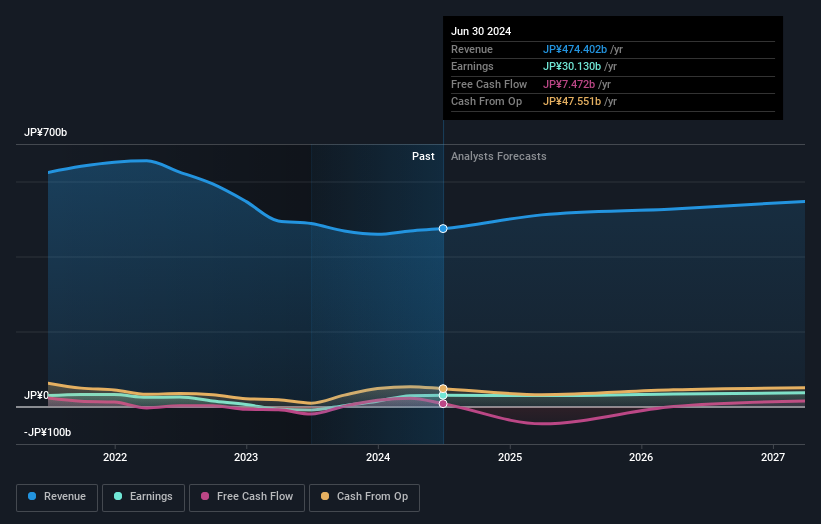Institutions along with retail investors who hold considerable shares inUBE Corporation (TSE:4208) come under pressure; lose 4.6% of holdings value

Key Insights
- The considerable ownership by retail investors in UBE indicates that they collectively have a greater say in management and business strategy
- 43% of the business is held by the top 25 shareholders
- Institutional ownership in UBE is 43%
To get a sense of who is truly in control of UBE Corporation (TSE:4208), it is important to understand the ownership structure of the business. And the group that holds the biggest piece of the pie are retail investors with 55% ownership. Put another way, the group faces the maximum upside potential (or downside risk).
While institutions who own 43% came under pressure after market cap dropped to JP¥247b last week,retail investors took the most losses.
Let's delve deeper into each type of owner of UBE, beginning with the chart below.
See our latest analysis for UBE

What Does The Institutional Ownership Tell Us About UBE?
Institutional investors commonly compare their own returns to the returns of a commonly followed index. So they generally do consider buying larger companies that are included in the relevant benchmark index.
We can see that UBE does have institutional investors; and they hold a good portion of the company's stock. This suggests some credibility amongst professional investors. But we can't rely on that fact alone since institutions make bad investments sometimes, just like everyone does. When multiple institutions own a stock, there's always a risk that they are in a 'crowded trade'. When such a trade goes wrong, multiple parties may compete to sell stock fast. This risk is higher in a company without a history of growth. You can see UBE's historic earnings and revenue below, but keep in mind there's always more to the story.

UBE is not owned by hedge funds. Nomura Asset Management Co., Ltd. is currently the largest shareholder, with 4.8% of shares outstanding. Meanwhile, the second and third largest shareholders, hold 4.5% and 3.8%, of the shares outstanding, respectively.
Our studies suggest that the top 25 shareholders collectively control less than half of the company's shares, meaning that the company's shares are widely disseminated and there is no dominant shareholder.
Researching institutional ownership is a good way to gauge and filter a stock's expected performance. The same can be achieved by studying analyst sentiments. There are plenty of analysts covering the stock, so it might be worth seeing what they are forecasting, too.
Insider Ownership Of UBE
The definition of an insider can differ slightly between different countries, but members of the board of directors always count. Company management run the business, but the CEO will answer to the board, even if he or she is a member of it.
I generally consider insider ownership to be a good thing. However, on some occasions it makes it more difficult for other shareholders to hold the board accountable for decisions.
Our most recent data indicates that insiders own less than 1% of UBE Corporation. However, it's possible that insiders might have an indirect interest through a more complex structure. It's a big company, so even a small proportional interest can create alignment between the board and shareholders. In this case insiders own JP¥489m worth of shares. Arguably, recent buying and selling is just as important to consider. You can click here to see if insiders have been buying or selling.
General Public Ownership
The general public -- including retail investors -- own 55% of UBE. This level of ownership gives investors from the wider public some power to sway key policy decisions such as board composition, executive compensation, and the dividend payout ratio.
Next Steps:
While it is well worth considering the different groups that own a company, there are other factors that are even more important. To that end, you should be aware of the 2 warning signs we've spotted with UBE .
If you are like me, you may want to think about whether this company will grow or shrink. Luckily, you can check this free report showing analyst forecasts for its future.
NB: Figures in this article are calculated using data from the last twelve months, which refer to the 12-month period ending on the last date of the month the financial statement is dated. This may not be consistent with full year annual report figures.
New: AI Stock Screener & Alerts
Our new AI Stock Screener scans the market every day to uncover opportunities.
• Dividend Powerhouses (3%+ Yield)
• Undervalued Small Caps with Insider Buying
• High growth Tech and AI Companies
Or build your own from over 50 metrics.
Have feedback on this article? Concerned about the content? Get in touch with us directly. Alternatively, email editorial-team (at) simplywallst.com.
This article by Simply Wall St is general in nature. We provide commentary based on historical data and analyst forecasts only using an unbiased methodology and our articles are not intended to be financial advice. It does not constitute a recommendation to buy or sell any stock, and does not take account of your objectives, or your financial situation. We aim to bring you long-term focused analysis driven by fundamental data. Note that our analysis may not factor in the latest price-sensitive company announcements or qualitative material. Simply Wall St has no position in any stocks mentioned.
About TSE:4208
UBE
Engages in the chemicals, construction materials, and machinery businesses in Japan, North America, Europe, Africa, the Middle East, Thailand, India, Latin America, and internationally.
Good value with proven track record and pays a dividend.


